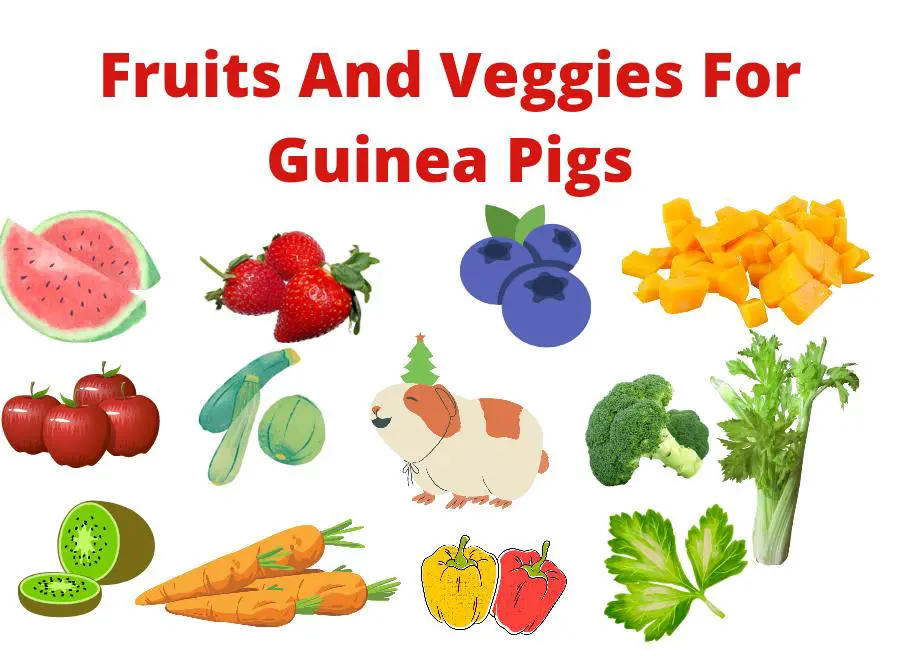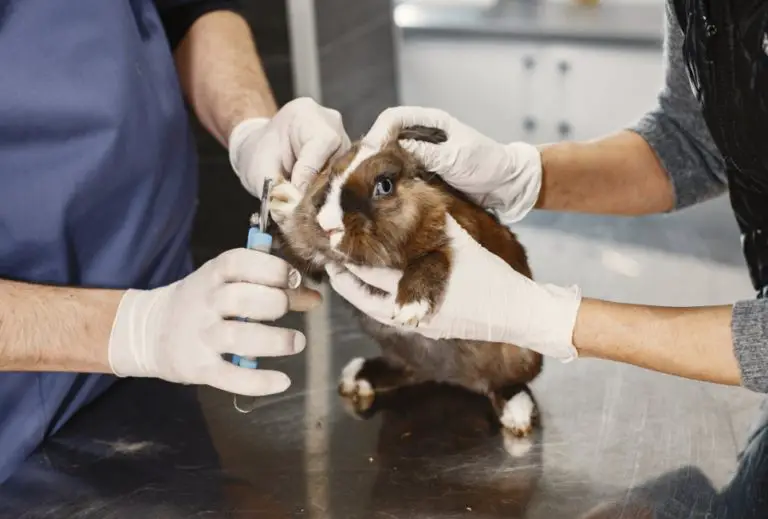20 Top Fruits And Veggies For Guinea Pigs

Looking for a healthy, tasty treat for your furry friend? Look no further than fruits and veggies!
Guinea pigs love these nutritious foods, and they are a great way to keep them happy and healthy.
Whether you’re looking to supplement your guinea pig’s diet or just want to give them a delicious snack, fruits, and veggies are the way to go.
Keep reading to learn more about the best fruits and veggies for your guinea pig!
Fruits And Veggies For Guinea Pigs
Let’s discuss fruits that are safe for guinea pigs before we talk about vegetables that are safe for guinea pigs.
Fruits that are safe for guinea pigs to eat
Here are some common fruits that are safe for guinea pigs to eat:
1. Apples
Guinea pigs can enjoy apples as a reward because they are a tasty and healthy fruit.
They are high in vitamin C, which is necessary for guinea pigs to have robust immune systems.
Moreover, apples are a good source of fiber, which promotes healthy digestion and helps avoid constipation.
When offering these to your guinea pig, it’s crucial to remove the seeds and core since they might be poisonous if consumed.
More on guinea pigs eating apples.
2. Blueberries
It’s okay for guinea pigs to consume blueberries in moderation because they’re a pleasant and healthy fruit.
They are an abundant source of vitamin C and antioxidants, which maintain the functioning of the immune system and work to prevent cell damage.
Also, they contain less sugar, which makes them a fantastic choice for guinea pigs that need to limit their sugar consumption.
3. Bananas
Bananas are a favorite fruit among guinea pig owners since they are simple to prepare and tasty for their pets.
Both potassium, which supports good heart function, and fiber, which promotes digestion, are abundant in them.
As guinea pigs often have digestive issues, make careful to remove the peel before giving them to your pet.
More on guinea pigs eating bananas.
4. Grapes
Guinea pigs occasionally appreciate the delicious, luscious fruit known as grapes.
They are a wonderful source of fiber and vitamin C, which support healthy digestive and immune systems.
To avoid a choking hazard, be sure to remove the seeds before giving them to your guinea pig.
More on guinea pigs eating grapes.
5. Oranges
Oranges are a delicious and healthy fruit that guinea pigs may consume sometimes.
They contain a lot of vitamin C, which supports strong immune systems.
These should only be given in little amounts since they are acidic and might upset the guinea pig’s stomach.
More on guinea pigs eating oranges.
6. Mangoes
Guinea pigs may consume mangoes, a tropical fruit, in moderation.
They are a good source of fiber and vitamin C, both of which support strong immune systems and gastrointestinal health.
Mangoes should only be consumed in moderation, though, as they are also heavy in natural sugars, which can lead to weight gain.
7. Papayas
Guinea pigs can be given papayas as a reward because they are a delectable tropical fruit.
They are a good source of fiber and vitamin C, both of which support strong immune systems and gastrointestinal health.
They should only be taken in moderation though because they are also high in natural sugars to prevent weight gain.
8. Strawberries
Guinea pigs may consume strawberries in moderation as they are a tasty and healthy fruit.
They are a good source of fiber and vitamin C, both of which promote sound immunological and digestive systems.
Also, they contain less sugar, making them a fantastic choice for guinea pigs who need to limit their sugar consumption.
Prior to offering them to your pet, wash them well since pesticides might be dangerous.
9. Kiwi
The tropical fruit kiwi is a favorite of guinea pigs as a special treat.
They are a good source of fiber and vitamin C, which assist digestion and a healthy immune system.
They should only be given in limited amounts because they are also high in natural sugars.
10. Melons
Guinea pigs may consume melons, such as cantaloupe and watermelon, in moderation.
They are a wonderful source of fiber and vitamin C, both of which support strong immune systems and regular bowel movements.
They should only be given in limited amounts because they are also high in natural sugars.
More on guinea pigs eating watermelons.
11. Tangerines
Guinea pigs can have tangerines as a reward because they are a tangy and sweet fruit.
They are an excellent source of vitamin C, which supports robust immune systems.
Nevertheless, because they are also acidic, they should only be given in modest doses to prevent the guinea pig’s stomach from becoming upset.
More on guinea pigs eat tangerines.
12. Raspberries
Raspberries are a tasty and nutritious fruit that is safe for guinea pigs to eat in moderation.
They are a rich source of antioxidants, vitamin C, and fiber, which help to maintain healthy immune systems and digestion.
Vegetables that are safe for guinea pigs to eat
Here are some safe vegetables that you can feed to your guinea pig:
1. Bell peppers
Since they are an excellent source of vitamin C, which is crucial for guinea pigs’ general health, bell peppers are a fantastic vegetable for guinea pigs.
Also, they have antioxidants that may strengthen their immune systems.
Bell peppers come in a range of hues, and it’s advised to give them to guinea pigs in moderation because they occasionally produce gas and bloating.
2. Carrots
Since they are an excellent amount of beta-carotene and vitamin A, which are crucial for guinea pigs’ eyesight, carrots are a favorite food among these rodents.
Carrots should only be consumed in moderation though, as they also contain a lot of sugar.
Giving guinea pigs too many carrots might cause obesity and other health problems.
More on guinea pigs eating carrots.
3. Cucumbers
For guinea pigs, cucumbers are a fantastic vegetable since they are low in calories and rich in water, both of which are vital for good health.
Furthermore, rich in vitamin C, cucumbers can strengthen their immune systems.
Cucumber peel and seeds should not, however, be fed to pets since they might be difficult to digest.
More on guinea pigs eating cucumbers.
4. Lettuce
Since it contains a lot of fiber, vitamin C, and other minerals, romaine lettuce is a fantastic food for guinea pigs.
Iceberg lettuce has minimal nutritional value and might cause digestive problems in guinea pigs, so it’s vital to avoid giving it to them.
More on guinea pigs eating lettuce.
5. Broccoli
The nutrient-rich food broccoli is rich in fiber, vitamin C, and other vitamins and minerals.
Broccoli is high in oxalates, which can cause bladder stones in guinea pigs, thus it should only be given in moderation.
Broccoli should only be given in tiny doses to guinea pigs that have a history of bladder stones.
More on guinea pigs eating broccoli.
6. Tomatoes
With their high vitamin C content and lycopene content, which is an antioxidant that can help prevent cell damage, tomatoes are a nutritious food for guinea pigs.
Tomato leaves and stems should not be fed to guinea pigs because they contain solanine, which is poisonous to them.
More on guinea pigs eating tomatoes.
7. Zucchini
Due to its low-calorie content and high water content, zucchini is a nutritious food for guinea pigs.
A good amount of vitamin C, which helps strengthen their immune system, is also present.
Both raw and cooked zucchini may be fed to guinea pigs, but it’s vital to remove the seeds beforehand.
8. Kale
Kale is a wholesome vegetable that is rich in calcium, iron, and vitamin C.
Nevertheless, because it also contains a lot of oxalates, which can cause bladder stones in guinea pigs, kale should only be consumed in moderation.
Kale should only be given to guinea pigs who have a history of bladder stones, and only in modest doses.
How to add fruits and vegetables to guinea pig diet
To add fruits and vegetables to a guinea pig’s diet, you can offer fresh vegetables once a day, equivalent to about one cup total per guinea pig per day.
Leafy greens like romaine lettuce, red and green leaf lettuces, kale, cilantro, and parsley should comprise the bulk of your pig’s fresh produce.
You can also offer occasional high-fiber fruits such as apples or pears.
When introducing new foods, it’s important to do so gradually and in small amounts.
Aim to feed three vegetable servings per day, with at least one being a leafy green, and no more than one serving of any given vegetable in a day.
Learn more about why your guinea pigs may not be eating.
Related questions
Can guinea pigs eat fruits and veggies?
Yes, guinea pigs can eat fruits and veggies, and they actually need a variety of fresh produce to maintain a healthy and balanced diet.
However, it’s important to introduce new foods slowly and in small quantities to avoid digestive problems.
What fruits are safe for guinea pigs to eat?
Some safe fruits for guinea pigs include apples, bananas, berries, cherries, grapes, and melons.
However, citrus fruits and other fruits with high amounts of sugar or acid should be avoided, as they can cause digestive issues.
Can guinea pigs eat vegetables every day?
Yes, guinea pigs should have fresh vegetables as a regular part of their diet.
Leafy greens like kale, spinach, and parsley are good choices, as well as other veggies like carrots, bell peppers, and cucumbers.
How much fruit and veggies should I be giving my guinea pig?
A good rule of thumb is to give your guinea pig about 1/8 to 1/4 cup of fresh veggies per day, along with a small piece of fruit as a treat.
However, it’s important to monitor your guinea pig’s weight and adjust your guinea pig’s diet accordingly.
Can guinea pigs eat the peel of fruits and veggies?
In general, it’s safe for guinea pigs to eat the peel of most fruits and vegetables.
However, be sure to wash all produce thoroughly and remove any seeds or pits that could be a choking hazard.
What are some signs that my guinea pig is not tolerating fruits or veggies?
Signs that your guinea pig may not be tolerating fruits or veggies include loose stools, diarrhea, bloating or gas, or a decrease in appetite.
If you notice any of these symptoms, it’s best to remove the new food from your guinea pig diet and consult with a veterinarian.
Conclusion
In conclusion, feeding your guinea pig a diet rich in fruits and veggies is not only important for their health, but it can also be a fun and rewarding experience for both you and your furry friend.
With a little bit of research and experimentation, you can find the perfect balance of fresh produce to keep your guinea pig happy and healthy.
So go ahead, grab some carrots and kale, and watch your guinea pig munch away!


![Can Guinea Pigs Eat Bananas [Helpful Tips] Can Guinea Pigs Eat Bananas](https://petcreeks.com/wp-content/uploads/2022/04/Can-Guinea-Pigs-Eat-Bananas-768x614.jpg)
![Can Guinea Pigs Eat Mandarins [Pros & Cons] Can Guinea Pigs Eat Mandarins](https://petcreeks.com/wp-content/uploads/2022/04/Can-Guinea-Pigs-Eat-Mandarins-768x614.jpg)
![Can Guinea Pigs Eat Apples [How To Feed] Can Guinea Pigs Eat Apples](https://petcreeks.com/wp-content/uploads/2022/04/Can-Guinea-Pigs-Eat-Apples.jpg)
![Can Guinea Pigs Eat Grapes [Helpful Tips] Can Guinea Pigs Eat Grapes](https://petcreeks.com/wp-content/uploads/2022/04/Can-Guinea-Pigs-Eat-Grapes.jpg)
